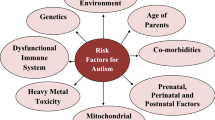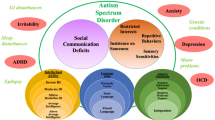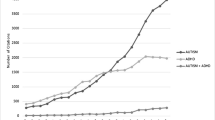Abstract
A controversy exists regarding the classification of nonorganic failure to thrive within the psychiatric nomenclature. There are a number of DSM-III-R diagnoses that may be applied to NOFTT, including Reactive Attachment Disorder of Infancy (RADI) and Major Depressive Disorder (MDD). The behaviors characteristic of NOFTT are symptomatic of depression, and are similar to those exhibited by infants with anaclitic depression as well as those of the adult with depression. The correspondence of the behaviours of NOFTT and the DSM-III-R criteria for Major Depression are reviewed, as are the conceptual and therapeutic reasons to view NOFTT infants as suffering from Depression.
Similar content being viewed by others
References
Rie HE: Depression in childhood: A survey of some pertinent contributions.J Am Acad Child Psy 5:653–685, 1966.
Trad PV:Infant and childhood depression: Developmental factors. 1987, NY: John Wiley & Sons.
Shafii M & Shafii SL: Depression in infancy, childhood, and adolescence: Failure in human contact, sadness, and withdrawal. In Shafii & Shafii (eds),Pathways of human development, ch 7. New York, NY, Theime-Strattan, 1982, pp. 77–95.
Spitz R, Wolf KM: Anaclitic depression: An inquiry into the genesis of psychiatric conditions in early childhood.Psychoanal Study Child, 2:313–342, 1946.
Spitz R: Emotional deficiency diseases of the infant. In Spitz R (ed),The first year of life, NY: International University Press, 1965, pp. 267–284.
Powell GF: Failure to Thrive. in Lifshitz F (ed)Pediatric Endocrinology, a clinical guide. New York, Marcel Dekker, Inc 1990 2nd edition, pp. 133–146.
American Psychiatric Association:Diagnostic and Statistical Manual of Mental Disorders, 3rd ed-Revised, Washington, DC, author, 1987.
Chatoor I, Egan J, Getson P, Menvielle E, and O'Donnell R: Mother-infant interactions in infantile anorexia nervosa.J Am Acad Child Psy 27:535–540, 1988.
Powell GF, Brazel JA, Blizzard RM: Emotional deprivation and growth retardation stimulating idiopathic hypopituitarism I: Clinical evaluation of the syndrome.New Eng J Med 276:1271–1278, 1967.
Ferholt JB, Rotnem DL, Genel M, Leonard M, Carey M, Hunter DEK: A psychodynamic study of psychosomatic dwarfism: A syndrome of depression, personality disorder, and impaired growth.J Am Acad Child Psy 24:49–57, 1985.
Powell GF, Brasel JA, Raiti S, Blizzard RM: Emotional deprivation and growth retardation stimulating idiopathic hypopituitarism II: Endocrine evaluation of the syndrome.New Engl J Med 276:1279–1283, 1967.
Sachar EJ, Finkelstein J, Helman, L: Growth hormone responses in depressive illness. Response to insulin tolerance test.Arch Gen Psychiat, 25:263–269, 1971.
Fischer LK: Hospitalism in six-month-old infants.Am J Ortho 22:522–523, 1952.
Engel GL, Reichman F: Spontaneous and experimentally induced depressions in an infant with a gastric fistula: A contribution to the problem of depression.J Amer Psychoanal Assn 4:428–452, 1956.
Emde RN, Polak PR, Spitz RA: Anaclitic depression in an infant raised in an institution.J Am Acad Child Psychiatry 4:545–553, 1965.
Davidson J: Infant depression in a “normal” child.J Am Acad Child Psychiatry 7:545–553, 1968.
Meyendorf R: Infantile depression due to separation from siblings: Syndrome of depression, retardation, starvation, and neurological symptoms. A re-evaluation of the concept of maternal deprivation.Psychiatric Clin (Basel), 4:321–335, 1971.
Bodtker JS: Psychotherapy of anaclitic depression with severe autistic withdrawal, in (ed)Depressive states in childhood and adolescence. Stockholm: Almqvist & Wiksell, 1971, pp. 405–411.
Gaensbauer TJ: Anaclitic depression in a three-and-one-half-month-old child.Amer J Psychiatr 137:841–842, 1980.
Coleman RW, Provence S: Environmental retardation (hospitalism) in infants living in families.Am J Psychaitr 127:22–25, 1957.
Chase HP, Martin HP: Undernutrition and child development.New Engl J Med 282:933–999, 1970.
Karniski W, Van Buren L, Cupoli JM: A treatment program for failure to thrive: A cost/effectiveness analysis.Child Abuse Negl 10:471–478, 1986.
Oates RK, Peacock A, Forrest D: Development in children following abuse and nonorganic failure to thrive.Am J Disease Child 138:764–767, 1984.
Barbero GJ, Morris MG, Redford MT: Malidentification of mother-baby-father relationships expressed in infant failure-to-thrive. In,The Neglected-Battered Child Syndrome. New York, NY, Child Welfare League of America, 1963, 13–19.
Aragona JA, Eyberg SM: Neglected children: Mother's report of child behavior problems and observed verbal behavior,Child Dev 52:596–602, 1981.
Berkowitz CD, Sklaren BC: Environmental fail to thrive: The need for intervention.Am Fam Phys 29:191–199, 1984.
Powell GF, Low J: Behavior in nonorganic fail to thrive.J Devel Beh Pediatr 4:26–33, 1983.
Powell GF, Low JF, Speers MA: Behavior as a diagnostic aid in failure-to-thrive.J Dev Behav Ped 8:18–24, 1987.
Pollitt E, Leibel R: Biological and social correlates of Failure to Thrive. In L Greene & EE Johnson, (eds.),Social and biological predictors of nutritional status, physical growth, and neurological development, 1980, 173–200, NY: Academic Press.
Gordon AH, Jameson JC: Infant mother attachment in patients with Nonorganic failure to thrive syndrome.J Am Acad Child Psychiat 18:251–259, 1979.
Cytryn L, McKnew DH, Bunney WE: Diagnosis of depression in children: A reassessment.Am J Psychiatr 137:22–25, 1980.
Gaensbauer TJ, Harmon RJ: Attachment behavior in abused/neglected and premature infants. In RN Emde & RJ Harmon, (Eds.),The development of attachment and affiliative systems. 1982, 263–279, NY: Plenum Press.
Ainsworth MDS, Bell SM, Stayton DJ: Infant-mother attachment and social development: ‘Socialization’ as a product of reciprocal responsiveness to symbols. In MPM Richards (ed.),The integration of the child into a social world, 1974.
deCaspar AJ, Fifer WP: Of human bonding: Newborns prefer their mothers' voices.Science 208:1174–1176, 1980.
Pollitt E, Eichler A, Chan CK: Psychosocial development and behavior of mothers of failure-to-thrive children.Am J Orthopsychiat 45:525–537, 1975.
Fraiberg S:Clinical studies in infant mental health: the first year of life. New York, NY, Basic Books, Inc, 1980.
Hunter J, Powell GF: Failure to Thrive. In Semmler CJ, Hunter J (eds):Early Occupational Therapy Intervention: Neonates to Three Years. Rockville, MD. Aspen Publishers, Inc, 1990 pp 185–196.
Brazelton TB, Koslowski B, and Main M: The origin of reciprocity. In Lewis M and Rosenblum L (eds):The effect of the infant on its caregiver. New York. Wiley, 1974. pp 49–76.
Cantwell DP: Depression in childhood: Clinical picture and diagnostic criteria. In DP Cantwell & GA Carlson (eds)Affective disorders in childhood and adolescence. Spectrum Publications, 1983, pp 3–18.
Author information
Authors and Affiliations
Rights and permissions
About this article
Cite this article
Powell, G.F., Bettes, B.A. Infantile depression, nonorganic failure to thrive, and DSM-III-R: A different perspective. Child Psych Hum Dev 22, 185–198 (1992). https://doi.org/10.1007/BF00705891
Received:
Revised:
Accepted:
Issue Date:
DOI: https://doi.org/10.1007/BF00705891




